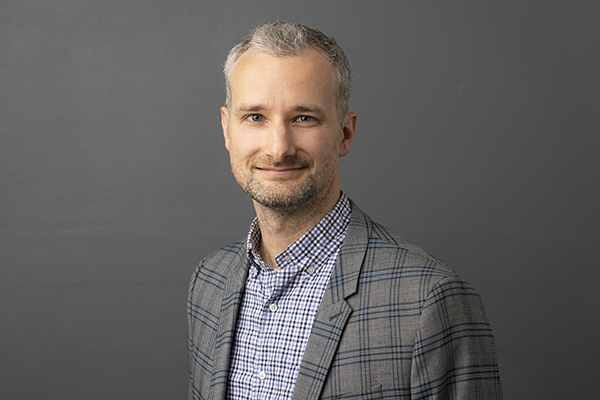Fabian Haiden
Research leader

Project title
The Emergent Geometry of Categories
What is your project about?
One of the big ideas in mathematics is the duality between algebra – the formal, symbolic – and geometry – the spatial, visual. This means that we can take a geometric problem and translate it into an algebraic one, which might be easier to solve, and vice versa. My project is about developing this mathematical dictionary for a novel algebraic structure called a category. These are used, for example, in the design of robust programming languages, to work out predictions of physical theories, or to understand large language models. The goal of the project is to develop the mathematical tools necessary to answer questions like: What is the origin of space-time in physics? How can we visualize, what is happening inside a neural network?
How did you become interested in your particular field of research?
In the 1997 film Contact, aliens make their presence known to us by sending a signal containing prime numbers - those numbers divisible only by themselves and 1. The idea is that mathematics is so foundational, so universal, that any intelligent life-form, no matter how different from us, would discover it. This universality is what gives mathematics its power and longevity – we are still using results discovered in antiquity – and what attracts me to the subject. My field, category theory is a relatively new branch of mathematics whose core principle is that objects are determined by their relations to others. For example, you could learn a lot about me by studying my social network. Another example: What gives a neuron in the brain its function is, how it connects to other neurons, not its internal properties.
What are the scientific challenges and perspectives in your project?
Probing the geometry of categories involves the idea, that certain objects in the category, called stable, are the fundamental building blocks out of which all others are built. When we take a picture of the category, so to speak, we want to apply a filter, that shows us only those stable objects. An approach to finding those stable objects was outlined almost 20 years ago, but has so far only been realised in special cases. My project aims to solve the stability problem for a much wider range of categories using two new constructions, partly inspired by physics. To achieve this, I will have the help of a postdoc and a PhD student, as well as the leading experts in the field in the US and France.
What is your estimate of the impact, which your project may have to society in the long term?
I believe that some of the big questions we are facing, such as: How can we ensure that algorithms, which are influencing more and more of our lives, do what we expect them to do? What do human brains and AI have in common? How do we formulate a physical theory of everything? will require as a key ingredient both old and new mathematics to answer. My project will build part of that foundation, one directly inspired by those questions.
Which impact do you expect the Sapere Aude programme will have on your career as a researcher?
A Sapere Aude: DFF Starting Grant is considered a great honor, and rightly so, given how competitive and thorough the selection process is. For me, the grant could not come at a more perfect time. It will take my career to the next level, allow me to start building a group, and make it possible for me to both carry out my research program, as well as create a path for new researchers entering the field. It will increase my impact both locally and globally. I am grateful for DFF’s support of basic science and young researchers in Denmark.
Background and personal life
I grew up in Austria and have since spent parts of my life in the US, UK, and France, before moving to Denmark with my wife and two kids. From an early age I became interested in science and technology. As a teenager I was coding 3-D graphics - my first contact with more advanced mathematics. These days I balance work with spending time with my wonderful family. We love nature and enjoy discovering Fyn’s beaches and forests.
View all research leaders here
Research institution
University of Southern Denmark
Research field
Mathematics
City of your current residence
Odense
High school
BG/BRG Klosterneuburg
